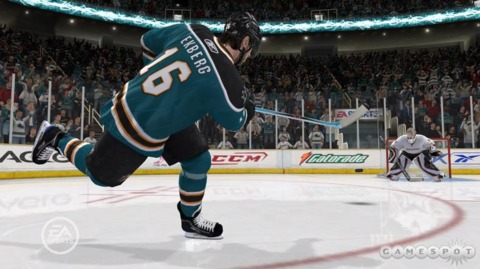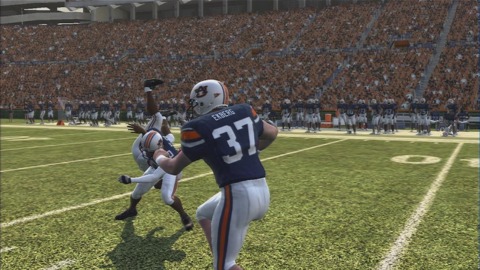The Present and Future of Career Modes
In the past couple of years, my sports gaming habits have completely changed. I used to be a season/franchise kind of guy, dialing up my favorite team and sticking with them through thick and thin for the duration. This, despite a complete and utter disinterest in the financial side of franchise...
In the past couple of years, my sports gaming habits have completely changed. I used to be a season/franchise kind of guy, dialing up my favorite team and sticking with them through thick and thin for the duration. This, despite a complete and utter disinterest in the financial side of franchise modes. Whenever possible, I let the CPU handle the majority of trades, contract renewals, and so on.
The rise of career modes in sports games has changed that. Starting with modes like Road to the Show in Sony's MLB series, Campus Legend and Superstar in EA Sports' NCAA Football and Madden series and, most recently, the cross-title phenomenon known as "Be a Pro" in EA Sports games, my interest has completely focused on my alter-ego in whatever game I happen to be playing.
Getting it done on the ice.
Take MLB 09's Road to the Show, for example. I've been aware of, and have dabbled in this mode for the past few years, but it's only really in this year's game that my career as a virtual baseball player has really come to life. Despite its shortcomings (and RTTS isn't perfect), I've found myself more engaged with this mode than any other aspect of the game. I was similarly obsessed with Be a Pro mode in last year's NHL 09 and the Campus Legend mode in NCAA Football 09.
You can draw parallels between the rapid evolution of sports game career modes to the similar pop culture prominence of modern pro athletes. Like the me-first athletes that these modes draw inspiration from, in career mode, it's all about your player, not your team. Sure, winning is great and championships are fun but the best career modes finely tune the focus of the game on you, your player, your performance, your stats. Like today's professional free agents, your entire purpose in career mode is getting the most out of your own career. Essentially, you can become the selfish, spoiled athlete, if only for a few hours.
And it feels good, too.
Three things to love about career modes:
- Responsibility -- As a pitcher in MLB 09's Road to the Show mode, there are few moments more terrifying than coming up to the mound with the bases loaded, zero outs and a miniscule lead for your team. The entire weight of the world rests on your shoulders, knowing that a single errant pitch can result in disaster for your team. Conversely, a few Ks and a ground-out can give you a feeling of satisfaction that's practically unmatched elsewhere.
The same is true when playing a quarterback in NCAA Football, or a goalie in NHL 09: career modes let you get perhaps as close as you can get to understanding what it's like to perform (or, indeed, completely blow it) in a big-time sports situation. That sense of responsibility over not just your team's outcome, but the fate of your player's career is what career modes do best.
- Ownership -- Going hand-in-hand with responsibility is the feeling of ownership you develop with your created character. I'm as zealous about my RTTS pitcher's ERA as I am with my yards total for my running back in NCAA Football 09. One bad statistical game--even in a winning effort--is enough to get me down in the dumps. One great performance, on the other hand, might be worth a Twitter post or two.
- Specialization -- I'm bad at batting in MLB 09. Terrible, in fact. I swing at everything. Fastballs over the middle, curve balls inside, change-ups on the outside. It doesn't matter. As long as the pitcher delivers it, I'll probably take a whack at it. Because of my lack of skill, I'm perfectly happy playing RTTS as a pitcher. Same with NHL. I'm terrible in goal and wouldn't dare take my lack of skill online and ruin someone else's game. Instead, I'm perfectly happy laying down hits as a checking left wing.
Specialization has its downsides. While pitching continues to be great fun for me well into my third season in RTTS, playing any position other than quarterback (and, to a slightly lesser degree, running back or defensive back) is a complete snooze in Madden and NHL. And while you could argue that this level of positional specialization doesn't do much to make you better at the game you're playing, why not let people play the game the way they want to?
Three things to hate about career modes:
- Separation -- While career modes revel in being all about your individual player, an unfortunate byproduct is an odd sense of separation from the rest of your team that occurs, particularly when playing baseball. Playing as a starting pitcher in MLB 09, for example, means you're pitching once every five days. When playing as a reliever, there's no telling when you'll get called in to a game--and when you'll go several days without seeing a single batter. This isn't such a big deal during the regular season, when games seem to count less, but it's a big-time problem once the playoffs begin.
In my RTTS campaign, my Chicago Cubs won the 2011 World Series in seven games against the Tampa Bay Devil Rays. My contribution to that epic eleventh-hour victory? Zero. Zilch. Nada. Instead, after the game was over, I was greeted with a screen of text congratulating me on the win. That's it. To be fair, this complaint is more an indictment of the sport of baseball (and the amount of time certain players go between starts) than it is its implementation in MLB 09 but I wish there was a way to let the player feel involved in his team's progress even when he isn't on the field.
- No Personality -- This is probably the most damning problem in career modes these days and, ironically, the one that poses the most danger when looking for solutions. After all, there's a sense of simply going through the motions in many career modes these days; whether you're simply simming to your next appearance or, worse yet, simulating the regular season until you get to the games that matter.
Still, while the day-to-day career can be a bit of a grind, adding flair to a career mode can be a minefield. Attempts at injecting some fun into career modes have sometimes come off like cheesy tacked-on solutions, like the "media" interviews in Madden's SuperStar mode or the fake college exams in Campus Legend mode in NCAA Football.
For a while now, Sony's MLB series has given you "interactions" in RTTS mode. Essentially choices you can make as a player--including things like complaining about playing time, looking for a new contract, etc.--that can have either a positive or negative effect on your player. For example, complain that you need to be a starter and you might convince your manager to make a move on your behalf. Or you might make him mad and find yourself missing your next start. It's not a perfect system--text menus are inherently pretty drab--but building on this kind of consequence-based interactions can go a long way towards making the time in between your next game something more than just checkmarks on your calendar.
- Money For Nothing -- After my Cubs won the World Series in RTTS, I was offered a four-year contract for a good chunk of money. How much money, you ask? Who cares! What does money matter in a world where you have nothing to spend it on? All I cared about was staying with my favorite team--not how much imaginary money I was getting paid to do so. Another way to incentivize career mode players to keep going with their careers is to give them something to spend their career earnings on. Things like unlockable jerseys or player cards, that kind of thing. 2K Sports had a good idea with the 2K Cribs thing a few years back--it wasn't a central theme of the game, just merely something you could customize as you went along, or choose to ignore altogether.
The point: I'm a big-time athlete making millions of dollars per year. Make me feel like it!
Not my RTTS pitcher. But a nice screenshot nonetheless.
Three things that career modes need to do next:
- Reward (and Punish) -- Whether it's keeping me engaged between game outings, or giving me something to spend my fake money on, the key is to keep the player always busy. I should be fending off calls from multiple agents trying to take control of my career. I should be trying to decide when to spend time in the gym, and when to spend it with my lady friend. I should spend the offseason getting fat. Or getting better.
Better yet, make the decisions I choose matter. If I spend time training my butt off on my jump shot in NBA Live, at the expense of hanging with the boys in the locker room, give me a boost to my jumper in the game, and lower my team chemistry rating as a result. Life is full of choices and all of those choices matter. Make them matter in the game too.
- We Talkin' About Practice -- Lots of games have dabbled with training the player over the years. Madden's training camp, MLB 09's batting and base-running training sessions, even practice mode in NCAA Football or the training mini-games in Fight Night Round 3. MLB 09 surprised me by not including any pitching training games, which I thought was a big omission this year. While I think that giving the player the option to play or ignore these training session is the right design choice, I think that the more opportunities you have to train your career mode player, the better.
- Mix It Up - NCAA Football has the right idea. Coming out of high school in Campus Legend mode, you compete for a chance to earn the starter position at whatever spot you play on the field. I like the direction of this feature but think there's still more room to grow. For example, why not give players the chance to come on board your program as an "athlete" position, try multiple positions on the field, and then choose the one that you like best (or, indeed, let the CPU coach decide for you). After all, spending four years as a fullback can get boring; what if, mid-way through your college career, your coach moves you to middle linebacker after a big injury to a team mate? Granted, it might not be for everyone, but adding a little randomness to a career mode might be just the kind of thing that spices things up over the long haul.
So that's what bumping around in my brain regarding career modes these days. I'm curious to hear what you think, too. Do you play in career mode? What do you like or dislike about them? Where do you think the modes will be next year, or five years from now?
Got a news tip or want to contact us directly? Email news@gamespot.com



Join the conversation